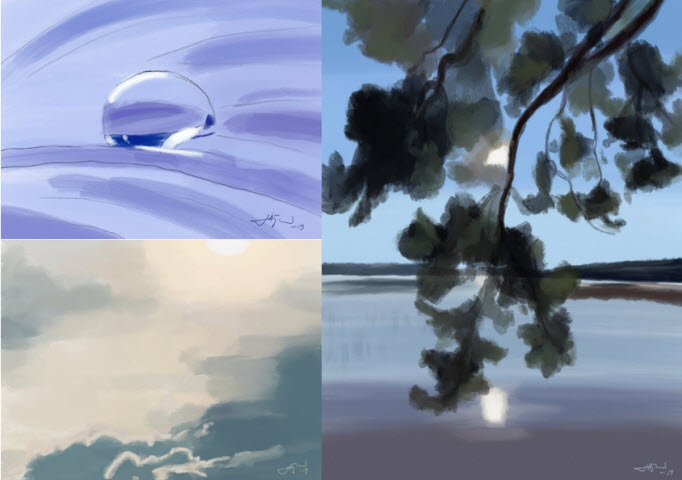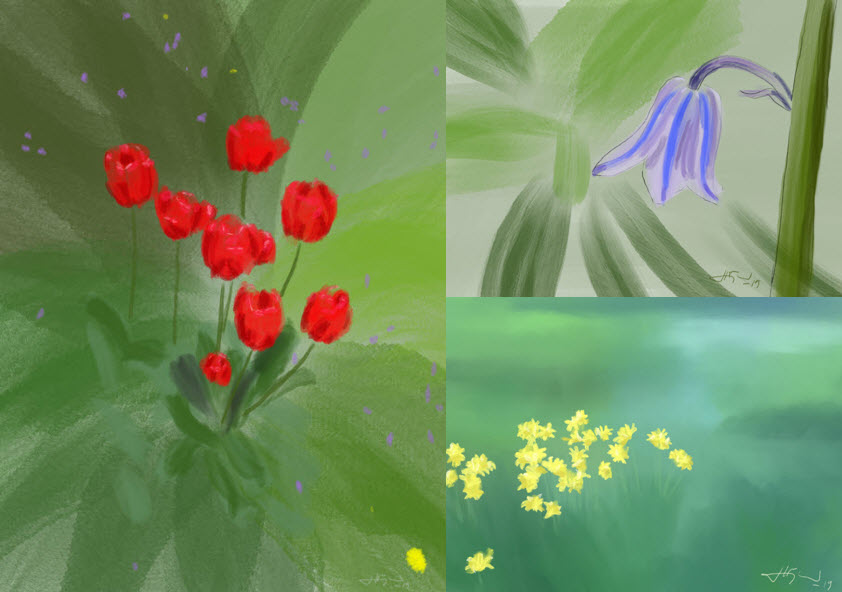Introduction
The purpose of this post is to summarize the week.
First, a short background. I have done weekly retrospectives since 2016. However, this is the first retrospective this year which I write in English. So much of what I read is in English, and it feels akward having to translate it into Swedish while summarizing. Swedish, on the other hand, is my native language, which means that if I want to express some tentative new thoughts, then English feels akward.
Paintings
I started painting a month ago, and, to my surprise, I’m pretty good ; ) I absolutely love it! Below are this week’s paintings.
Books
I’ve finished reading On Dialogue by David Bohm. I warmly recommend the book and will write a book review next week.
Notes
Below are notes I’ve written to myself (with the most recent first). Many of them come from my reading of Christopher Alexander, Eugene Gendlin, Robert Hartman, and David Bohm:
- Both Christopher Alexander and David Bohm talk about ‘unfolding.’ For Alexander it’s an unfolding from the Whole, for Bohm it’s an unfolding from the implicate order.
- Our ‘organizing‘ prevents our organizations from unfolding.
- A gentle hug changes the emotional landscape.
- We are looking through our assumptions.
- Those who benefit most from a system are those who don’t take it too seriously.
- Assumptions produce their own intentions.
- “Respect for people” is to value people intrinsically (as defined by Robert Hartman).
- Dialogue may occur but is by no means guaranteed.
- Defensive posturing can diminish when there’s warmth and fellowship.
- The ‘tacit ground‘ is what holds work together.
- The ‘life‘ we experience in each moment is deeply correlated with the ‘space‘ in which we find ourselves. (This is a paraphrase of Christopher Alexander.)
- We need to pay more attention to the wholeness (Bortoft) of work, in particular to include intrinsic values (Hartman) and degrees of life (Alexander) in the organizations we create.
- The organism is not the sort of thing that can properly act mechanically. (This is a paraphrase of David Bohm)
- Disharmony inevitably arises from trying to impose a defined process.
- A child learns to walk and to talk just by trying something out and seeing what happens. As the child grows older learning becomes narrower. In school, s/he learns by to please the teacher and pass tests. At work, s/he learns to please the manager and make a living.
- Thoughts emerge, create actions, and leave traces in the world.
- We unconsciously practice metaphysics through our prevailing world view.
- Insight and imagination give rise to one another.
- When the original insight has established itself, new lines of conjecture and reasoning emerge. Strict formality and logic may expose hidden contradictions and limitations, which may lead to new insights.
- When the intrinsic meaning of an insight is tentatively formulated in language it can be reflected upon internally, as well as be provisionally communicated externally with others.
- Varying degrees of wholeness, while not algorithmic, are neither random nor accidental.
- Giving simple attention is itself a primary creative act. Creativity is not the result of a planned and formulated goal, but rather the by-product of an attentive mind.
- Insights can result in entirely new conceptual structures.
- Experience can be structured through the use of concepts.
- I can only change myself. When I change, you change.
- Generative organizing works with invisibles, dimensions of human experience that can be felt. (This is related to Eugene Gendlin’s notion of felt sense.)
- Silence speaks.
- Life is now.
Articles
Below are articles which I read this week (I mention them here so that I can go back if I want to):
- Resilience Engineering Notes by Lorin Hochstein. Resilience describes how well a system can handle troubles that were not foreseeable by the designer. There’s a change in perspectives on accidents and safety which is relevant for generative organizing as well. The traditional approaches often focus on “minimizing variance associated with humans doing work, using techniques such as documented procedures and enforcement mechanisms for deviating from them“, while the “new view” focuses on “understanding how actions taken by actors involved in the incident were rational, given what information those actors had at the time that events were unfolding.” “A recurring theme in resilience engineering is about reasoning holistically about systems… When you view the world as a system, the idea of cause becomes meaningless, because there’s no way to isolate an individual cause. Instead, the world is a tangled web of influences.“
- Whole Intelligence and the global emergency by Malcolm Parlett. “An existential crisis provokes us to think about our individual responses, facing the extremity of our human & global predicament. We wonder what … steps that we can take to embolden ourselves to live more faithfully in accord with our deepest values … “
- Arthur Koestler: 20th century man by Masha Karp. This article reminded me of my own post on Arthur Koestler. Koestler coined the term holarchy. He criticized the mechanistic view of organisms, and called the doctrine that they are “essentially passive automata controlled by the environment, whose sole purpose in life is the reduction of tensions“, a monumental superstition. Said differently, it’s a monumental mistake to view people essentially as sensors controlled by the organization, whose sole purpose is to process tensions.
- Henri Bortoft’s Explorations of Goethe’s Dynamic Way of Seeing by Simon Robinson. “Goethe directs us into the sensory experience & away from the verbal, logical, conceptual & abstract mind. … when we move into an analysis of dynamic organisms, our minds encounter paradoxes, which they are unable to resolve within their own way of thinking.“
- Nature Unfolding by Tricycle, where Katy Butler speaks with Christopher Alexander. “If people think something ought to be a certain shape and then they start making it that shape instead of doing what the unfolding tells them to do, they will royally screw it up. Because of concepts! Concepts interfere with this process… Because human concepts, no matter how cleverly conceived they are, almost always work against the Whole. And that’s what we’ve been witnessing in architecture now for about one hundred years. The world is now prevented from unfolding.”
- Business “Basics for the Brink of Extinction by Michelle Holliday. Michelle Holliday writes that: “…in my experience, methods and techniques are a dime a dozen. Packaged with a shiny bow. Promised to work, just add water. Yet it’s never that easy, is it?” Yes, it’s never that easy! Methods and techniques need to unfold.
Poem
The following poem came to me this week (in English and Swedish):


Leave a Reply
You must be logged in to post a comment.